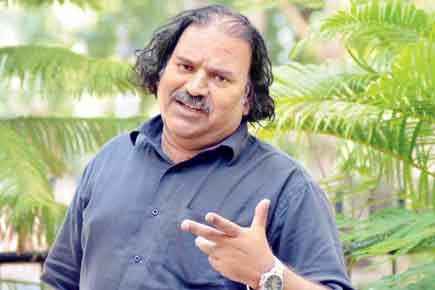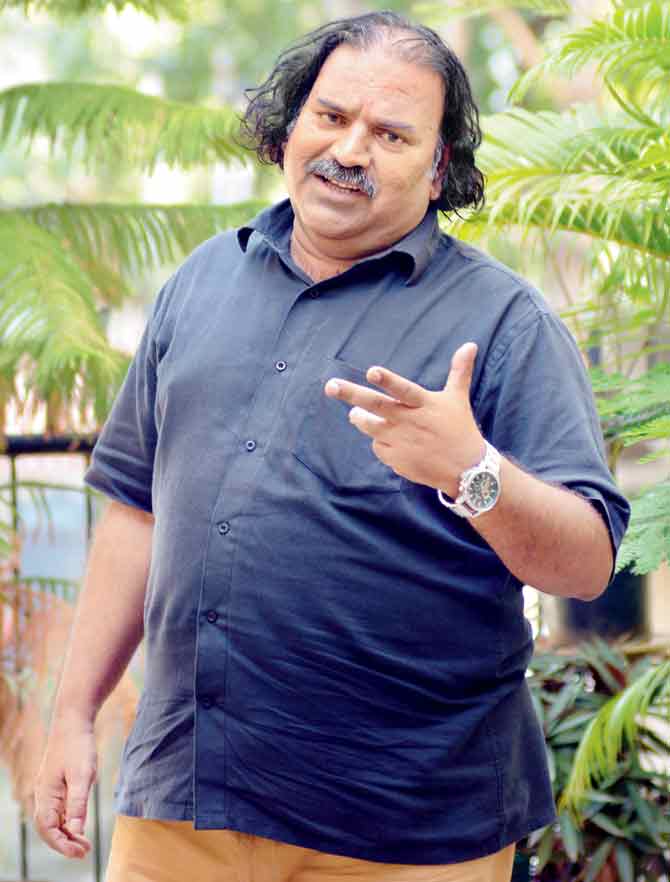Sambhaji Bhagat, whose songs inspired India’s Oscar-entry, Court, is determined to make Bal Bharti poems go ‘live’ through aninnovative project

Sambhaji Bhagat
Dalit activist and lok shahir Sambhaji Bhagat is a worried man. The name that inspired debutant director Chaitanya Tamhane to make Court, this year’s official entry from India to the Oscars, is ironically far from nervous about the 2014 indie Marathi film’s fate. There are plenty of people “far savvier than me” who will ensure a buzz is drummed up around it.
ADVERTISEMENT
It’s a small project, closer home and to his heart, that’s got him in a nicely nervous tangle.
Close on the heels of October 15, which the Maharashtra government is celebrating as Vaachan Prerana Diwas in the memory of late Indian President APJ Abdul Kalam, Bhagat will launch a CD and an online version of nine Marathi poems, all currently housed in the fifth standard text book prescribed by the state education department.

Sambhaji Bhagat
He calls it a happy coincidence that his personal textbook poetry popularisation project, which he calls Gau Anande (Let’s Sing Happily), has tied in with the state’s initiative to inculcate the reading habit among school kids. With the popularity wave surrounding him and Court, the timing couldn’t have been better. “I am loving it!” he smiles.
“It is the right time then for me to promote a mass awareness programme that makes reading fashionable,” adds Bhagat, 54, member of the editorial board of the Maharashtra State Bureau of Textbook Production and Curriculum Research, popularly known as Bal Bharati.
The position has offered him an insider’s view and he is of the opinion that school books sit way too low on a student’s reading list, and the state curriculum could do with a powerful marketing boost.
As a veteran in folk theatre, having roamed the state’s interiors, he’d know. In the 1980s, as a young man from Mahu
in Satara District, looking for a job in Mumbai, he joined a left-wing agitprop group called Avahan. For the next 10 years, they toured the state with their brand of cultural resistance dominated by street theatre, Dalit music and Leftist ideas.
“In the 30 years I spent in street theatre, I observed how primary and secondary students, whether in rural or urban schools, don’t enjoy poetry. The nine poems are a starting point,” he says.
Surprise visits he made to schools in Dharavi and Korba in Mumbai, and Dholavira (in Gujarat) reinforced his belief. “And never did I come across harmonious poetry recitations — a roomful of happy students enjoying a poem aloud with their teachers.” This was in contrast to Bhagat’s own childhood experience where singing aloud and uninhibited was a part of growing up.
We’ve already wasted enough time, he suddenly says. “Let’s do it before it is too late; we have to jazz up our textbooks and pit them against the power of television. TV is processed food, poetry is life.”
He can’t see it any other way. As a resident of Wadala’s Siddharth Vihar hostel in 1979, where the Dali Panther movement was born, and later as a balladeer taking on the establishment during political agitations centring around the rights of textile mill workers, poetry has been the punctum of his being. More than writing it, which he now does rarely, he is celebrated for his full-throated singing, heavily leaning towards bharud, powada and gondhal folk styles. He adds in jest, “Whenever I am short of funds, I sing. People donate generously during my performances.”
In other words, Bhagat’s jalsas have unfailingly got him an audience, and with it, support — whether during the movement to rename Marathwada University in Aurangabad to Babasaheb Ambedkar Unive-rsity (in 1994 the name of Dr Babasaheb Ambedkar Marath-wada University was accepted) or his ballad of dissent, Shivaji Underground in Bhimnagar Mohalla. The 2012 Marathi play challenged the halo (and popular myths) surrounding Chhatrapati Shivaji, going on to be called a significant play of our times. It won him the Marathi International Film and Theatre Award for music design, and was a story inspired by his experiences during the 1993 Mumbai riots.
His hunger to work with students goes back to the time Dalit youth from Pune, who would eventually go onto form the Kabir Kala Manch, approached him because they liked his songs. Disillusioned after the Gujarat riots, they wished to take up social issues through song. Their work became too popular for their own good when they were branded anti-establishment.
Bhagat’s belief in a collective jalsa is reflected in the ‘makeover’ of textbook poetry he is championing. Working in close collaboration with education officers at Bal Bharati, Bhagat has managed to rope in Rahul Ranade and Kamlesh Bhadkamkar to compose music for select poems, while giving music to three poems himself.
The credit for the idea, he hands to B B Chavan, education officer, South Zone Mumbai, but remembers to discuss contributors who have chipped in by reciting poems for impressionable school-goers. Veteran Marathi actor Sachin Khedekar is one of them. Reciting the Marathi translation of Safdar Hashmi’s poem, he joins the likes of Sadhana Sargam, Ketaki Mategaonkar and Nandesh Umap, all of who recorded their individual poems in Suresh Wadkar’s studio. “We hope that once the poems reach the students (they can also be downloaded from the education department’s websites) in a jazzed up avatar, it will be easier for them to remember the lines,” says Bhagat, who is looking to turn his attention to school children instead of adults. “It is much more fulfilling than attending a seminar on caste and class politics,” he laughs.
And to catch their attention, he must seek newer forms of expression. “Neither armed aggression nor fasts unto death are working with the current generation. We need newer tools of outreach, and I say with confidence that poetry might just be the most effective way of connecting.”
 Subscribe today by clicking the link and stay updated with the latest news!" Click here!
Subscribe today by clicking the link and stay updated with the latest news!" Click here!








